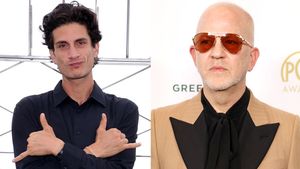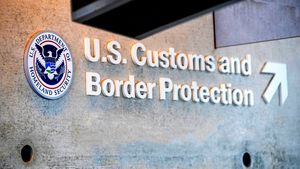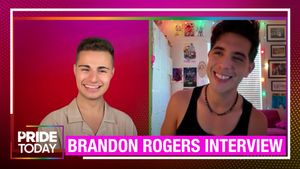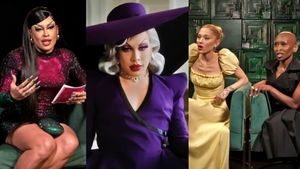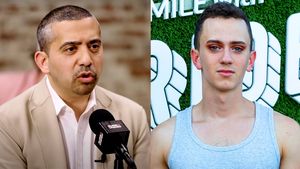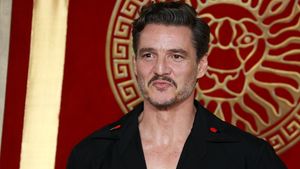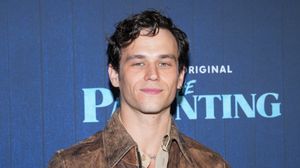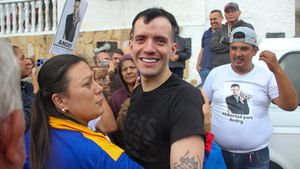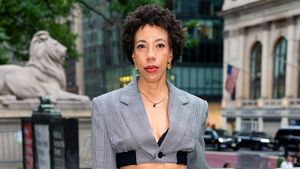Late one Sunday,
Travis Shumake and a gay buddy went to brunch at the
gay-themed diner Hamburger Mary's in Phoenix. There
are more gay people in the world? Travis thought. And
they have their own restaurant? I want to work here!
He walked up to the front counter, asked for a job, and was
hired on the spot as a host. He started two days later.
It was there that Travis was first introduced to
the larger gay world, but it wasn't until he
started donating to the Human Rights Campaign and
attending its fund-raising dinners that he began to plug
himself into the network of Arizona's gay
leadership. The state has an unusual penchant for
electing gay Republicans: Two of them, former Tempe mayor
Neil Giuliano and former state legislator Steve May,
take turns hosting regular Sunday night "family
dinners" to help mentor up-and-coming young gay
leaders. Travis, who jokes that he's the only gay
Democrat in Arizona angling for public office, has
eagerly attended the dinners for years.
Giuliano, 48, says they discuss national
politics, gay history, breaking up honorably with a
boyfriend, how to establish oneself within a community
long before canvassing for votes--the kind of vital
guidance he never received when he was 20. He
sincerely believes that for Travis and other leaders
in his generation, being gay will be even less of a
roadblock to elective office than it is today. After saying
that, though, he pauses.
"Because things have been relatively easy
for them," he says, "[and] they
haven't faced any direct discrimination, perhaps they
don't see themselves as being limited in terms
of careers--all that is very good. On the other
side, that makes them a little blind to the realities of the
discrimination that still does exist and the struggles that
have been made. There's a lot of people who
have come before them who have made it possible for
them to be out and open and comfortable with themselves in
their teenage and college years."
Indeed. The worst experience with discrimination
Travis says he's ever faced came this spring,
when he ran for student body president at Northern
Arizona University, a school of 16,000 nestled in the
mountain city of Flagstaff, a liberal enclave in an
otherwise steadfastly conservative state.
A friend of one of Travis's opponents
stood for an hour in a residence hall elevator, asking
students as they rode to and from class, "Who are
you voting for? You shouldn't vote for Travis.
He's gay.... You know that Travis kid?
He's a f****t." Later that day Travis called
the opponent; he remembers that his words tumbled out
fast and angry: "I've never done
anything slanderous toward you, and this is really hurting
me emotionally now.... My sexual orientation
shouldn't be brought up."
Much of what
stung Travis about the incident was the fact that more often
than not his sexual orientation isn't brought up, or
at least it doesn't bear any of the weight of
shame that has saddled so many gay men before him.
"I feel like it is such not a big deal to
be gay," he says. "I know that's
so weird, but I feel like I'm the beginning of that
next generation of people--like, literally by a
school year. Like, if I were a year older, it would be
different, because I know when I was a junior [in high
school] there were seniors that hated me. It's so weird."
He is almost always smiling, and his 6-foot-4
cheerleading-toned body is carried by an ambling,
bouncy gait. He is a triple major in political
science, hotel and restaurant management, and electronic
media--the guy's life is often scheduled
to the minute.
Travis initially had a tough time rushing Sigma
Chi as a freshman after several seniors decided they
didn't want their house to be known as the
"gay fraternity." His story will be featured
this fall in Brotherhood, the sequel to Out on
Fraternity Row, published by The Advocate's
corporate cousin Alyson Books.
Travis did eventually pledge Sigma Chi,
"and now every fraternity's got, like,
at least two gay guys." He revels in the chance to
use the fraternal bonds he's formed--and
the lingering guilt some feel about how he was
treated--to confront some of his brothers'
views about, say, same-sex marriage. "I would
say [to a brother who is against it], 'So you
didn't want me to have kids and ever get married.
Thanks,' " he grins. "And
I'd walk out of the room and come back in and be
like, 'Just joking. But we should talk about this.' "
One topic Travis has not quite broached at
Giuliano and May's Sunday dinners is his belief
that homosexual acts are a sin. In fact, he tosses out
this conclusion so casually that it requires a few minutes
of back-and-forth to clarify. Does he mean hooking up
with any person before marriage? No, he replies, it is
that he's hooking up with a guy. Not that this
presents a crippling moral dilemma for him.
"You sin just as much as I do," he tells his
straight Christian friends who brings this issue up,
"and this is just one of my sins. It has no
heavier weight than your sin, and I ask for forgiveness, and
you ask [for] forgiveness, and we're good to go."
Travis, one must understand, is the son of a
Southern Baptist minister who sat his family in the
front pew every Sunday morning and never, not once,
preached against homosexuality.
When Travis was in middle school, his mother
announced that she wanted a divorce, a small scandal
that instantly estranged her from the congregation. He
"officially" came out to her just last summer;
she had long since figured it out, of course, and now
she asks about potential boyfriends. He never got a
chance, however, to have the same conversations with
his father, who died in a car crash when Travis was 16.
Whatever well of grief and anguish he's
carrying over that loss, Travis is adept at skittering
past it in conversation. He coped by throwing himself
back into his father's church, spending an average of
30 hours a week there as a youth leader, he estimates.
He knows every book of the Bible. He recognizes
Christian rock songs when they pop on the radio.
"I'm your top-of-the-line Christian kid, but
I'm gay."
He has, he says,
"a plan": graduate in two years, then get a
master's in public policy while also securing a
husband, "have a kid by 27 and have a second
one on the way by 29 and not be my parents, who had me at
33." He then foresees running for office while
running the books for a local resort. He says he wants
"to be gay, but I want to be normal."
If some chinks can be perceived in
Travis's
it's-really-not-a-big-deal-to-be-gay armor, it is
worth observing that most true leaders are rife with
contradiction. In Travis's case, the
decisiveness that he displayed at Hamburger Mary's
and elsewhere can be a real double-edged sword: He
doesn't seem prone to dwelling on an issue
before it lands directly before him or all that keen on
ruminating over it once he's made his decision.
To wit: He says he never really considered the
question "Was I born gay?" until someone
asked it of him in college. He thought back to his middle
school years spent in an arts school studying dance and
hanging with a gaggle of openly gay kids; to his
parents' divorce and their remarriage to other
people; his father's death; being the youngest of
five siblings and the only boy among them (two of his
sisters are stepsiblings and one is a half sibling);
and going through adolescence surrounded by females.
He decided that when it came to his sexuality, "all
fingers point to conditioning." He understands
it is very much a minority view. "I'm not
saying that no one's born gay. I'm just saying
I don't think that I was." He hesitates.
"Weird, right?"
Travis sighs, his face for the first time
subdued and serious. He talks about feeling pressure
to always achieve--from whom or what, he's not
really sure. Then this slips out: "I think
it's because I want to overcompensate because
I'm afraid that people won't like me because
I'm gay." Sure, his high school voted
him student body president. Sure, he has never been
bullied or physically intimidated because he was gay.
Sure, he has mentors who have taught him about Stonewall. It
doesn't mean homophobia hasn't wormed
its way inside Travis's psyche.
"I am so proud of being gay," he
says, "but can't I be Travis the
president? The common thing I get is 'gay Travis, the
tall cheerleader.' Can I just not be that
anymore? Can I just be Travis who is gay and loves
being gay and that's great, it's a part of his
life, but Travis who has achieved great things and
Travis who has goals and ambitions to make a
difference while being gay?
"The one thing that makes me so upset
about people is being defined [by their sexuality
labels]," he says. "I don't own
anything that has a rainbow on it. I just don't
feel like I need to wear it on my sleeve. I
don't need to impose my sexual orientation on others
in such a blunt way. I love to talk about it when
people ask me about it. I rode in the gay pride parade
in Phoenix two weekends ago--I'm proud to be
gay, but I'm saying I feel like it perpetuates
the stereotypes when we're defined [solely] by
our sexuality."


